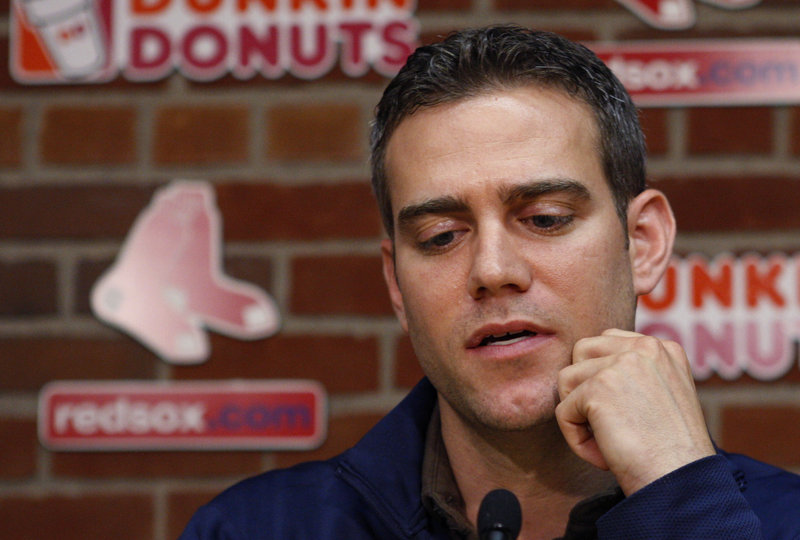CHICAGO – Theo Epstein’s journey from summer intern to youngest general manager in major league history to designated savior was quick by baseball standards.
Twelve years after starting out as a glorified gopher at Camden Yards in Baltimore in 1992, Epstein steered his beloved Boston Red Sox to their first world title in 86 years in 2004, then added a ring three years later in case anyone thought the first was a fluke.
Next on Epstein’s bucket list is fixing the franchise that’s chewed up and spit out managers, general managers and presidents for decades.
After a whirlwind courtship, Epstein has agreed to a five-year, $15 million deal to head the Cubs’ baseball operations department, starting a new chapter in the team’s long and luckless history.
The Cubs wouldn’t comment on the deal, which was first reported Wednesday by Boston radio station WEEI. The sides are still sorting out compensation — minor league players or cash – and whether Epstein can bring anyone from Boston to work under him in Chicago.
A title has yet to be announced, but Cubs Czar would seem apt because Epstein is being given unlimited power to change the culture of the franchise.
The Cubs’ chairman, Tom Ricketts, over the weekend brought Epstein to Chicago to let him know he would be the face of the franchise, putting him on the same level as the team president, Crane Kenney. Epstein will report directly to Ricketts, and be in charge of all baseball decisions.
The hiring signals a change in philosophy for the Cubs, who had been branded as an old-school team under former general manager Jim Hendry, a scout at heart. Hendry had a difficult time hiding his disdain for the computer-toting analysts pervading front offices throughout the game, the kind that Ricketts was seeking.
The hiring of stats guru Ari Kaplan in 2010 telegraphed Ricketts’ intention of moving into the analytical age, and a poor start in 2011 meant Hendry’s days were numbered.
Coincidentally, Hendry has been an admirer of Epstein, whose free agent signings haven’t always worked out. Some have been outright busts, like John Lackey, Mike Cameron, Daisuke Matsuzaka, Bobby Jenks and so far, Carl Crawford.
Epstein always has taken responsibility for the bad ones, evidenced by his comment last summer after releasing Cameron, whose two-year, $15.5 million deal didn’t pan out.
“If it doesn’t work out we have to say it didn’t work out,” Epstein said. “I’m not going to sugar-coat it, it didn’t work out. We think very highly of Mike as a person and player. It didn’t work out for the Red Sox despite his best effort.”
But Epstein’s reputation for developing stars like Dustin Pedroia, Jacoby Ellsbury and Jon Lester, in addition to his belief in the religion of sabermetrics, made him the No. 1 choice of Ricketts all along.
Despite the Cubs’ obsession with all things Red Sox, few believed a Ricketts-Epstein baseball marriage would be consummated. Epstein was seemingly a valued employee of the Red Sox, and was especially close to the owner, John Henry.
But the Red Sox’s owners like to take an inordinate amount of credit for the team’s recent success, as though Epstein was just a passenger on the joyride. One media guide proclaimed “the leaders of the Red Sox achieved the ultimate goal — they broke the ‘Curse of the Bambino,’ if it ever existed, and extinguished the suspense and frustration that had been a psycho-civic phenomenon known throughout the world of sports.”
A late-season collapse by the 2011 Red Sox set in motion the Cubs’ stealth pursuit of the Boston GM, and Henry did little to convince Epstein they wanted to keep him past the final year of his deal. The Cubs are expected to pay the $3.5 million exit ‘bonus’ in his Red Sox contract.
Epstein has been underestimated most of his career, in part because of his youthful looks. One major league executive recalled Epstein being “treated like dirt” by other GMs at his first winter meeting in 2002, thinking he was just a water carrier for the Red Sox president, Larry Lucchino.
The difficulty in Epstein’s latest challenge, rescuing a financially strong franchise from a century-old problem, depends on who you ask. Some see the Ricketts fortune and the three million-plus attendance total for another fifth-place team as an indication the Cubs can buy their way out.
Others look at the Ricketts’ spending habits, the lack of prospects in the system, and Alfonso Soriano’s unloadable contract, and see a three- to four-year plan at the very least.
Copy the Story Link
Send questions/comments to the editors.



Success. Please wait for the page to reload. If the page does not reload within 5 seconds, please refresh the page.
Enter your email and password to access comments.
Hi, to comment on stories you must . This profile is in addition to your subscription and website login.
Already have a commenting profile? .
Invalid username/password.
Please check your email to confirm and complete your registration.
Only subscribers are eligible to post comments. Please subscribe or login first for digital access. Here’s why.
Use the form below to reset your password. When you've submitted your account email, we will send an email with a reset code.